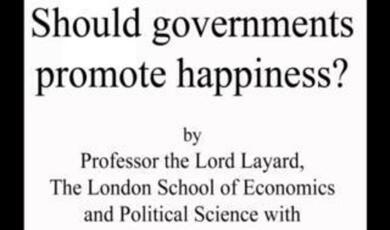Do we need a martian invasion in order to avoid attacking each other?
Share
- Details
- Transcript
- Audio
- Downloads
- Extra Reading
Is human co-operation possible without external threats? What are the possibilities of co-existence and collaboration at the start of the twenty-first century?
Download Transcript
DO WE NEED A MARTIAN INVASION IN ORDER TO AVOID ATTACKING EACH OTHER?
Professor Rodney Barker
Is human co-operation possible without external threats? What are the possibilities of co-existence and collaboration at the start of the twenty first century?
______________________________________________________
1 PICTURE
2 PICTURE
The Irish Taoiseach De Valera's dispatch of 13 fire engines in the Second World War on the night of April the 15th 1941. One enemy can trump another:
I've talked in previous lectures about enemies and the stories, true, exaggerated, and entirely fictional, that are told about them, and about the effects of these stories
1. Enmity can frequently lead to unity or enhance identity.
The theorists of enmity have always pointed to its advantages
3 PICTURE
Greeks before and after the Persian empire
480 BC against Persia. The 300 were not the only ones: there was a larger Athenian army in support. The Persian threat united the whole Peloponnesian peninsula, and the crucial battles were to follow, at Salamis where a largely Athenian fleet destroyed Persian naval power, and at Plataea where a combined Greek, Spartan led force destroyed Persian invading land forces.
431 BC Peloponnesian War
And when a state seems to have no obvious enemies, it seems actively to seek them or to seek for stories to tell about their alleged existence.
All alone without an enemy in the world seems far worse than all alone without a friend
But that gives unity only of one state or group of states, against another state or group of states. Each depends on OTHER humans as enemies.
The price of unity and solidarity within states seems to be hostility BETWEEN them
: enemies unite societies, but in so doing lead to conflict with other societies.
Nor does and external enemy even guarantee internal cohesion or harmony
Internal division unavoidable
However comprehensively the enemy is defined, there will always be those within the 'friend' society who seem to have more in common with the enemy than with their fellow citizens, and who can be labelled as traitors or suspects whose loyalties lie elsewhere
And the more fiercely, colourfully, and dramatically the enemy is described and national orthodoxy painted, the more likely it is that there will be those who don't fit into the patriotic pigeon hole.
Telling stories about external enemies may unite societies and make the colourful portrayal of social and national identity simpler, but frequently at the expense of minorities, because societies are never entirely homogenous, all of one kind.
These minorities, as social phenomena, may even be created by the narrative:
all kinds of people who in all kinds of ways differ from each other become identified as 'the black community' or 'the Asian community' or 'the Muslim community'
We have plenty of that kind of unity at the start of the 21st century, when attempts are made to unify a society by its cultural or religious identity in the face of opposing cultures or faiths :
Samuel Huntington's scenario between 1993 & 1996: a clash of civilisations whose basis is religious - Christianity, Islam - But this has proved to be not only a scenario for division between societies, but for division and intolerance and enmity within them
Religious extremism, condemnations based on faith: and any religious faith can be tailored and recruited in this way so that the enemy, the other, is as much within as without
Hindu nationalism, Gujarat, On December 6, 1992, destruction of Babri mosque in city of Ayodhya in state of Gujarat, claims it was built on earlier Hindu holy site.
Islamism, On 12 November 2005 three churches (Catholic, Salvation Army and United Presbyterian), in Sangla Hills, Pakistan, were attacked and destroyed by a large crowd
The troubles in Northern Ireland illustrated that the divisions within a religion can be at least as great as those between religions, and again can simplify and obliterate real identities - the Doctor and the bomb
nationalist Orthodoxy in Russia: persecution of non-Orthodox sects.
SO There are two reasons to deplore attempts to create internal peacefulness and order by means of descriptions or conjuring up of external threats and enemies or by making comprehensive distinctions between 'them' and 'us':
Global disharmony
Internal repression and discrimination, since societies are NOT uniform
The fictional solution has been non-human enemies:
4 PICTURE
5 PICTURE
Mars attacks. The story is an old one in science fiction
In the face of fictional extra-terrestrials, humanity unites
2. Do we need a Martian invasion in order to avoid attacking each other?
But if Mars is not available as a useful enemy, are there threats which are to the entire human race, and which can serve, for humanity as a whole, the function that threatening, or allegedly threatening, other states serve?
A metaphysical version of the Martian is the devil, but where he has been invoked, the result has more usually been to unite only one part of a community, whilst demonising another. Martians are not usually attributed with human allies, but the Devil is
But can something be rescued, if a common threat can still sometimes unite former opponents, is there a way in which they might unite humanity, or at least stop us attacking one another?
Is there a way in which there are common threats which can lead to the creation of an account of ALL people which does not stigmatise minorities but at the same time depends on an account of humanity which is common without being uniform?
What about human solidarity? An enmity free world?
Is it possible to have solidarity and vitality without the destructive consequences of enmity and demonisation, in the face of some common, non-human threat?
3. Non-human threats?
Yet there have been instances where people who consider that they have little or nothing in common with one another can discover or acquire a common identity in the face of a threat which does not distinguish between classes or cultures, rich or poor
6 PICTURE
Cholera & typhoid fever in the nineteenth century European city: collective action, since disease does not respect class or geography. Hills and prevailing winds were insufficient defence.
The Broad Street Pump, John Snow, 1854 cholera
7 PICTURE
Similarly with the effect of total war from 1939 and the response in the provision of medical services. Even though the bombing was selective, the impacts were pervasive. All were threatened, and hospital provision was extended in a precursor to the introduction of the NHS after the war's end.
Perhaps at the start of the Twenty First century, we don't need Mars, since there appear to be global threats to humanity as such.
8 PICTURE
Like disease in the nineteenth century European city, all will suffer. Never send to tell for whom the bell tolls.
But: 1. While threats to nations may unite, threats to the whole world don't necessarily: The tragedy of the commons
2. Why should we suffer, you first. Nations such as China which have a way to go before graduating to their full pollutant potential, are reluctant to stop now while richer nations enjoy the fruits of years of environmental degradation
3. The poorest and least powerful are the most at risk
If the negative threat of global warming is not sufficient, are there positive incentives or mechanisms which would achieve a similar result?
4. But if threats and enemies are not the answer, are there positive rather than negative ways of ending or at least reducing animosity and conflict? Can we try doing things the other way round
i) Global politics, global government, universal co-operation,
Some of the theories. Where are we now?
Democracies do not attack one another (Spencer Weart, Never at War,1998: similarity and mutual recognition)
League of Nations
Between 1919 after the end of the First World War and the outbreak of the Second
United Nations
Each relied on the consent and mutual respect which they were at the same time intended to cultivate
A more recent proposal has been for global democracy
Either the people of the world would act as a single unit for some form or forms of global governance or global politics, or different movements or associations of people would act, across or without regard to national boundaries, for common purposes. The various groups who have demonstrated at global summits are seen as at least partial moves in this direction
Objections to this: democracy requires a demos, and what it proposed as a solution is in fact what it is hoped to achieve. If it existed then problems would be solved, but the problem is how to get there in the first place. In other words, it's a bit like saying that the answer to war, is peace
{On the other hand, in acting as if it existed, it is brought into existence ('preach until you have faith',
but also Mill and many others on the value of parliamentary politics)}
5. ii) Markets as an alternative to war?
Dr Johnson: A man is seldom more innocently occupied than when he is engaged making money
Norman Angell's optimism,
The growth of an international economy, and hence of mutual dependence, so that war was not an effective way of safeguarding or cultivating individual or national interests, and was damaging to them
That the arguments were advanced in the years leading up to the First World War provided an historical counter example.
And more recently one might say that whilst international dependence might have led one to expect that oil dependent nations would establish non-belligerent relationships with oil producers, it seems not to have prevented the United States from invading Iraq and supporting a coup in Venezuela
The argument rested on a liberal, and rational, individualist conception of reason and interest.
Rationality is subordinate to identity
The end of ideology in the 1950s, and again in 1989
Francis Fukuyama and the end of history: but one devil was replaced by many!
Yet optimism remained, with Thomas Friedman's Golden Arches Theory of Conflict Prevention, which states: "No two countries that both had McDonald's had fought a war against each other since each got its McDonald's".
6. iii) Have we simply let the wrong people be in charge? Take the toys from the boys. Gender?
We know that men who are in touch with their feminine side are less prone to heart attacks. Could a society which is less dominated by its male side be similarly less vulnerable to attacks of enmity and aggression?
Expectation/hope of Virginia Woolf in 1938,
7. iv) Solidarity: Spencer, Kropotkin, Titmuss
Spencer: voluntary co-operation succeeding military command and domination
Kropotkin, Mutual Aid:
An alternative to social Darwinism as applied to individuals, natural selection applies to species not persons
Mutual aid the base, altruism the human pinnacle
Co-operation is both rational and successful in evolutionary terms:
Evidence of successful human trans-national collaboration and co-operation. International postal union
Richard Titmuss, The Gift Relationship, 1970 and altruism: actual alternative ways of doing things, so that no utopia is required to be described, and a present choice exists
The provision of blood:
Inadequacies of market individualism
In 2007 this proved to have been exactly the case with plasma in the 1970s and 1980s provided for haemophiliacs, which was contaminated with Hepatitis C or HIV as a result of sold blood from US prisons
Altruism more efficient than markets
Back to Hegel. Solidarity is not a denial of self, but a fulfilment
mutual recognition, difference with respect
How do I get to Dublin?
If I were you I wouldn't start from here.
But here is where we are, so what are the possibilities?
And if co-operation is rational, how or why had people got it wrong?
9. Where to now?
The problem with each of the 4 possibilities just discussed is that none of them provide the easy mechanism of a described person to blame or with whom to compare ourselves or against whom animosity can be directed.
Perhaps we can create unity and identity without anyone to blame, fear, or oppose.
Because if not, anyone who seriously wants to cultivate solidarity amongst all peoples will have to convince them that there is a Martian invasion on the way after all.
©Professor Rodney Barker, Gresham College, 3 March 2008
This event was on Mon, 03 Mar 2008
Support Gresham
Gresham College has offered an outstanding education to the public free of charge for over 400 years. Today, Gresham plays an important role in fostering a love of learning and a greater understanding of ourselves and the world around us. Your donation will help to widen our reach and to broaden our audience, allowing more people to benefit from a high-quality education from some of the brightest minds.


 Login
Login











